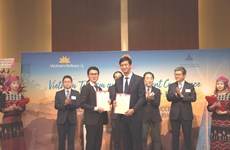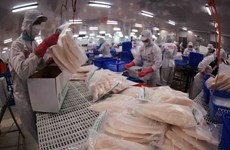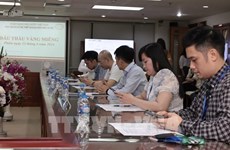Trans-Pacific Partnership negotiations in progress: official
The latest round of TPP negotiations was wrapped up in Utah, Salk Lake
city, the US on November 26, opening up opportunities for concerned
parties to reduce disagreements before the TPP Ministerial Meeting is
due to open in Singapore next month.
The latest round of TPP negotiations was wrapped up in Utah, Salk Lake
city, the US on November 26, opening up opportunities for concerned
parties to reduce disagreements before the TPP Ministerial Meeting is
due to open in Singapore next month.
Radio the Voice of Vietnam (VOV) interviewed Deputy Minister of Industry and Trade Tran Quoc Khanh, chief negotiator for the TPP on the progress of negotiations.
* As scheduled, the round of negotiations in Brunei in August was the last one. Could you elaborate on the latest round in Utah, its main contents and goals?
This was an additional one, not on the agenda, but focused on resolving outstanding issues to a certain extent.
We planned to conclude our negotiations in Brunei in late August. However, there remain snags in some issues. So the latest round of negotiations aimed to resettle them. We tried our best to reduce disagreement before the ministerial meeting is held in Singapore from December 7-10.
* Did you see any progress by comparison with the set targets?
The one-week session led to positive progress in many issues such as intellectual property, state-owned enterprises (SOEs), labour and environment.
However, the most crucial snag faced by Vietnam and other TPP nations is related to goods.
To ease the situation, Vietnam affirmed that the export of goods is the country’s keen interest and there should be positive progress in the negotiations of goods so that the country could consider and make decisions on other issues including political decisions.
* What are the outstanding issues on the agenda of the upcoming Ministerial Meeting in Singapore next month?
In my opinion, it is important for ministers to make decisions on the issue of goods which is of common concern to many nations.
Ministers have to make tough decisions as well as concessions about some important goods like Vietnam’s garment and textile and footwear, New Zealand’s milk, Australia’s sugar and Japan’s automobiles.
Only when there is progress in this field, can ministers make decisions on the other issues such as intellectual property, SOEs, environment, labour. These are complicated issues and they will have to work hard on a comprehensive tariff package for negotiation groups to finish their work.
Other issues are related to food and safety hygiene, and technical barriers in trade. Ministers should also devise different tariff packages in order to conclude the negotiations.
* As the chief negotiator for TPP, what do you think about the possibility of concluding TPP negotiations late this year as committed by concerned parties?
From now till the end of 2013, there is only a ministerial meeting in Singapore - the last chance for ministers to consider and make important decisions. If we look forward to a comprehensive agreement, it is not ready for concerned parties to sign. But if we only hope for some basic agreement reached by ministers, negotiation groups should sit together to think about the wording and conclude the agreement at the meeting.
From my perspective, ministers have to work hard to solve the outstanding issues. They should have bilateral discussions during the four-day meeting in Singapore. I hope that the meeting will contribute to ironing out snags in negotiations for the final agreement.-VNA
Radio the Voice of Vietnam (VOV) interviewed Deputy Minister of Industry and Trade Tran Quoc Khanh, chief negotiator for the TPP on the progress of negotiations.
* As scheduled, the round of negotiations in Brunei in August was the last one. Could you elaborate on the latest round in Utah, its main contents and goals?
This was an additional one, not on the agenda, but focused on resolving outstanding issues to a certain extent.
We planned to conclude our negotiations in Brunei in late August. However, there remain snags in some issues. So the latest round of negotiations aimed to resettle them. We tried our best to reduce disagreement before the ministerial meeting is held in Singapore from December 7-10.
* Did you see any progress by comparison with the set targets?
The one-week session led to positive progress in many issues such as intellectual property, state-owned enterprises (SOEs), labour and environment.
However, the most crucial snag faced by Vietnam and other TPP nations is related to goods.
To ease the situation, Vietnam affirmed that the export of goods is the country’s keen interest and there should be positive progress in the negotiations of goods so that the country could consider and make decisions on other issues including political decisions.
* What are the outstanding issues on the agenda of the upcoming Ministerial Meeting in Singapore next month?
In my opinion, it is important for ministers to make decisions on the issue of goods which is of common concern to many nations.
Ministers have to make tough decisions as well as concessions about some important goods like Vietnam’s garment and textile and footwear, New Zealand’s milk, Australia’s sugar and Japan’s automobiles.
Only when there is progress in this field, can ministers make decisions on the other issues such as intellectual property, SOEs, environment, labour. These are complicated issues and they will have to work hard on a comprehensive tariff package for negotiation groups to finish their work.
Other issues are related to food and safety hygiene, and technical barriers in trade. Ministers should also devise different tariff packages in order to conclude the negotiations.
* As the chief negotiator for TPP, what do you think about the possibility of concluding TPP negotiations late this year as committed by concerned parties?
From now till the end of 2013, there is only a ministerial meeting in Singapore - the last chance for ministers to consider and make important decisions. If we look forward to a comprehensive agreement, it is not ready for concerned parties to sign. But if we only hope for some basic agreement reached by ministers, negotiation groups should sit together to think about the wording and conclude the agreement at the meeting.
From my perspective, ministers have to work hard to solve the outstanding issues. They should have bilateral discussions during the four-day meeting in Singapore. I hope that the meeting will contribute to ironing out snags in negotiations for the final agreement.-VNA













